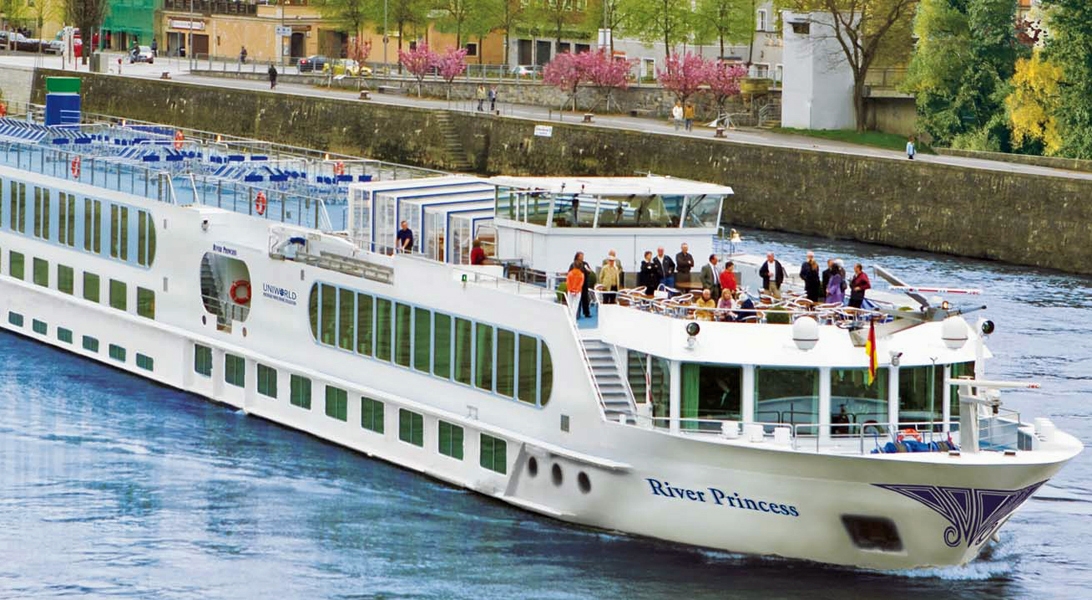| | | | | Arrive | Depart |
| 30th30 | MarMar | 202525 | Antwerp, Belgium, embark on the River Princess | | |
Explore Antwerp, Belgium's second city. Known for its diamond cutting industry, fashion and the many great artists that lived in its vicinity, Antwerp is a city focused on art and culture. Arrive at Brussels International Airport. If your cruise package includes a group arrival transfer or if you have purchased a private arrival transfer, you will be greeted by a Uniworld representative and transferred to the ship. |
| 31st31 | MarMar | 202525 | Antwerp, Belgium | | |
Explore Antwerp, Belgium's second city. Known for its diamond cutting industry, fashion and the many great artists that lived in its vicinity, Antwerp is a city focused on art and culture. It may be the diamond capital of the world, but Antwerp is also known for a number of other sought-after cultural gems, including Golden Age art and Belgian beer, waffles and fries. Visit Antwerp’s striking Cathedral of Our Lady, with its UNESCO-designated belfry and its historic surroundings, or, if you’re feeling adventurous, hop on the metro and experience the city like a local. |
| 1st01 | AprApr | 202525 | Gent (Ghent), Belgium | | |
| Your next day in Belgium offers you the chance to visit one of two national gems: beautiful Bruges, the capital of West Flanders and one of the best-preserved medieval cities in Europe, or fascinating Ghent, the capital city of East Flanders, whose long history does not weigh on its vibrant present. Belgium’s second largest city, Ghent abounds in medieval architecture, but there’s nothing museum-like about the city. It’s lively and brims with cutting-edge boutiques and galleries. |
| 2nd02 | AprApr | 202525 | Veere, Netherlands | | |
| Today, your ship docks in the Zeeland village of Veere. A harbor village on the shores of the Western Scheldt, Veere may be a small town now, but its stately 15th-century town hall tells of a grander past. For three centuries it was the bustling center of the wool trade with Scotland; the wealth from this trade built the splendid church with its tall and ornate steeple that dominates the village, as well as the handsome mansions on its main street. |
| 3rd03 | AprApr | 202525 | Rotterdam, Netherlands | | |
Rotterdam is a city that's a long way removed from most people's stereotypical notion of the Netherlands. There are few, if any, canals to be found here nor are there any quaint windmills. There is, however, a thriving modern city which is one of the busiest ports in the entire world. Rotterdam is thoroughly modern—you’ll soon understand why it’s sometimes called “Manhattan on the Meuse”: The Maas Tower, the Montevideo, the Millennium Tower and the spectacular Erasmus Bridge make for a dazzling skyline. Begin your day by exploring this modern city on a Dutch culinary stroll, with a stop at the architectural milestone, Market Hall. Erected in 2014, it’s known for its futuristic look and unique culinary offerings. Later, head to Kinderdijk to discover why windmills are such an iconic symbol of Holland; marvel at their engineering and learn about their role in changing the course of Dutch history. |
| 4th04 | AprApr | 202525 | Nijmegen, Netherlands | | |
| For your choice of excursions today, visit the Kröller-Müller Museum, which is home to 97 works by native son Vincent van Gogh as well as other notable artists and sculptors. Or opt for a walking tour of Nijmegen. |
| 5th05 | AprApr | 202525 | Hoorn, Netherlands | | |
| Spend some time exploring the picture-perfect town of Enkhuizen and leave the modern world far behind as you visit a recreated 19th-century Dutch village. Later, you’ll discover the town of Hoorn’s seafaring past, where the swashbuckling derring-do of Dutch explorers will come to life on a guided walking tour of this historic locale. |
| 6th06 | AprApr | 202525 | Haarlem, Netherlands | | |
| Spend half a day among millions of brilliantly colored flowers in Keukenhof, then mix it up a bit with a visit to and exploration of Haarlem’s art, history and Dutch lifestyle. |
| 7th07 | AprApr | 202525 | Amsterdam, Netherlands | | |
Amsterdam combines the unrivaled beauty of the 17th-century Golden Age city center with plenty of museums and art of the highest order, not to mention a remarkably laid-back atmosphere. It all comes together to make this one of the world's most appealing and offbeat metropolises in the world. Built on a latticework of concentric canals like an aquatic rainbow, Amsterdam is known as the City of Canals—but it's no Venice, content to live on moonlight serenades and former glory. Quite the contrary: on nearly every street here you'll find old and new side by side—quiet corners where time seems to be holding its breath next to streets like neon-lit Kalverstraat, and Red Light ladies strutting by the city's oldest church. Indeed, Amsterdam has as many lovely facets as a 40-carat diamond polished by one of the city's gem cutters. It's certainly a metropolis, but a rather small and very accessible one. Locals tend to refer to it as a big village, albeit one that happens to pack the cultural wallop of a major world destination. There are scores of concerts every day, numerous museums, summertime festivals, and, of course, a legendary year-round party scene. It's pretty much impossible to resist Amsterdam's charms. With 7,000 registered monuments, most of which began as the residences and warehouses of humble merchants, set on 160 man-made canals, and traversed by 1,500 or so bridges, Amsterdam has the largest historical inner city in Europe. Its famous circle of waterways, the grachtengordel, was a 17th-century urban expansion plan for the rich and is a lasting testament to the city’s Golden Age. This town is endearing because of its kinder, gentler nature—but a reputation for championing sex, drugs, and rock ’n’ roll does not alone account for Amsterdam's being one of the most popular destinations in Europe: consider that within a single square mile the city harbors some of the greatest achievements in Western art, from Rembrandt to Van Gogh. Not to mention that this is one of Europe's great walking cities, with so many of its treasures in the untouted details: tiny alleyways barely visible on the map, hidden garden courtyards, shop windows, floating houseboats, hidden hofjes(courtyards with almshouses), sudden vistas of church spires, and gabled roofs that look like so many unframed paintings. And don’t forget that the joy lies in details: elaborate gables and witty gable stones denoting the trade of a previous owner. Keep in mind that those XXX symbols you see all over town are not a mark of the city's triple-X reputation. They're part of Amsterdam's official coat of arms—three St. Andrew's crosses, believed to represent the three dangers that have traditionally plagued the city: flood, fire, and pestilence. The coat's motto ("Valiant, determined, compassionate") was introduced in 1947 by Queen Wilhelmina in remembrance of the 1941 February Strike in Amsterdam—the first time in Europe that non-Jewish people protested against the persecution of Jews by the Nazi regime. The Netherlands’ largest city, Amsterdam, has been an international port and financial center for 400 years. Your day begins with a morning visit to the Fabrique des Lumières. Later, see the sites by canal boat. |
| 8th08 | AprApr | 202525 | Amsterdam, Netherlands, disembark the River Princess | | |
Amsterdam combines the unrivaled beauty of the 17th-century Golden Age city center with plenty of museums and art of the highest order, not to mention a remarkably laid-back atmosphere. It all comes together to make this one of the world's most appealing and offbeat metropolises in the world. Built on a latticework of concentric canals like an aquatic rainbow, Amsterdam is known as the City of Canals—but it's no Venice, content to live on moonlight serenades and former glory. Quite the contrary: on nearly every street here you'll find old and new side by side—quiet corners where time seems to be holding its breath next to streets like neon-lit Kalverstraat, and Red Light ladies strutting by the city's oldest church. Indeed, Amsterdam has as many lovely facets as a 40-carat diamond polished by one of the city's gem cutters. It's certainly a metropolis, but a rather small and very accessible one. Locals tend to refer to it as a big village, albeit one that happens to pack the cultural wallop of a major world destination. There are scores of concerts every day, numerous museums, summertime festivals, and, of course, a legendary year-round party scene. It's pretty much impossible to resist Amsterdam's charms. With 7,000 registered monuments, most of which began as the residences and warehouses of humble merchants, set on 160 man-made canals, and traversed by 1,500 or so bridges, Amsterdam has the largest historical inner city in Europe. Its famous circle of waterways, the grachtengordel, was a 17th-century urban expansion plan for the rich and is a lasting testament to the city’s Golden Age. This town is endearing because of its kinder, gentler nature—but a reputation for championing sex, drugs, and rock ’n’ roll does not alone account for Amsterdam's being one of the most popular destinations in Europe: consider that within a single square mile the city harbors some of the greatest achievements in Western art, from Rembrandt to Van Gogh. Not to mention that this is one of Europe's great walking cities, with so many of its treasures in the untouted details: tiny alleyways barely visible on the map, hidden garden courtyards, shop windows, floating houseboats, hidden hofjes(courtyards with almshouses), sudden vistas of church spires, and gabled roofs that look like so many unframed paintings. And don’t forget that the joy lies in details: elaborate gables and witty gable stones denoting the trade of a previous owner. Keep in mind that those XXX symbols you see all over town are not a mark of the city's triple-X reputation. They're part of Amsterdam's official coat of arms—three St. Andrew's crosses, believed to represent the three dangers that have traditionally plagued the city: flood, fire, and pestilence. The coat's motto ("Valiant, determined, compassionate") was introduced in 1947 by Queen Wilhelmina in remembrance of the 1941 February Strike in Amsterdam—the first time in Europe that non-Jewish people protested against the persecution of Jews by the Nazi regime. Disembark the ship. If your cruise package includes a group departure transfer or if you have purchased a private departure transfer, you will be transferred to Amsterdam Airport Schiphol for your flight home. |

